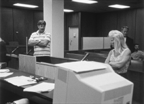DV2
 USA / 2002 / English / Color / 16mm / 160 min
USA / 2002 / English / Color / 16mm / 160 min
Director, Editor, Sound, Producer: Frederick Wiseman
Photography: John Davey
Production Company: Domestic Violence Film
Source: Zipporah Films
One Richdale Avenue, Unit #4, Cambridge Massachusetts 02140 USA
Phone: 1-617-576-3603 Fax: 1-617-864-8006
E-mail: info@zipporah.com URL: www.zipporah.com
 In the Florida night Disney World rises from the light. On a nearby road a woman tries in vain to argue her case and is taken away in a police car. This is the domestic violence law in action, and ironically if violence is involved even in a lover’s spat, the lovers are arrested.
In the Florida night Disney World rises from the light. On a nearby road a woman tries in vain to argue her case and is taken away in a police car. This is the domestic violence law in action, and ironically if violence is involved even in a lover’s spat, the lovers are arrested.
In contrast to the director’s previous film, Domestic Violence, which told the story from the viewpoint of victims and was set in a shelter for victims of domestic violence, this film shows the perspective of the assailants. Various cases are tried in the arraignment, misdemeanor, and injunction courts of the courthouse. There are courts where groups of victims and assailants sit together as the trials are carried out, where each group is tried separately, and others where the assailants appear only on TV monitors so that the concerned parties do not come in contact. Several trials are filmed at length. As is typical in Wiseman’s films, the people who appear act completely as themselves in front of the camera and exude personality. Their lives and dramas emerge from the court trials. With touches of humor Wiseman turns his dry gaze on our society where violence is part of everyday life and is even directed against our loved ones, on the judiciary violence which merely opposes it, and the exhausted system, presenting the grand tableau of the courthouse as a stage where various aspects of the human condition are acted out.
—Tomita Mikiko
[Director’s Statement] Many of my films have been concerned with the subject of violence. The subject has often been the State’s monopoly on external violence as illustrated in films like Basic Training, Manoeuvre and Missile, or the State’s control of internal violence in such films as Law and Order, Juvenile Court, and Titicut Follies, or the State’s interest in the scientific control of violence as illustrated by Primate. A film about violence in the family and the State’s interest in limiting and ameliorating it through the courts, the police and other state agencies is a natural extension of the themes of the earlier films.
 Frederick Wiseman
Frederick WisemanBorn in Boston in 1930. Made his directorial debut in 1967 during the height of direct cinema with Titicut Follies, a film about a facility for the criminally insane. Has made about one film per year throughout his thirty-year filmmaking career. His films, including High School (1968), Law and Order (1969), Hospital (1970), Manoeuvre (1979), Missile (1987), Near Death (1989), High School II (1994), and Ballet (1995), explore the daily routine of American institutions. Model (1980) was shown as a special invitation film at YIDFF ’91, and Zoo (1993) was awarded the Mayor’s Prize at YIDFF ’93. In 1997 Wiseman visited Yamagata again and received the Special Prize for La Comédie Française ou l’ amour joué (1996). Belfast, Maine (1999) was awarded the Mayor’s Prize at YIDFF ’99, and Domestic Violence (2001) was also screened at YIDFF 2001. His most recent film is The Last Letter (2002). |
• Special Invitation Films | DV2 | Sound of Brasil | Number Zero | <In Memory of Maeda Katsuhiro> Polluted Japan, Free Kwangju | Magino Village—A Tale |
